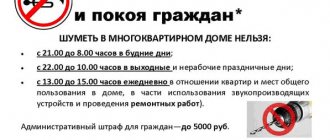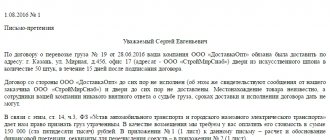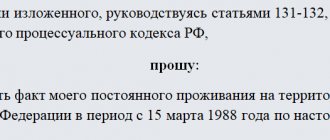For a person, a home is a place of solitude and tranquility, where after a working day there is an opportunity to relax, sleep at night, and on weekends enjoy a morning sleep. But, unfortunately, this does not always happen, this idyll is disturbed by noisy neighbors who have started renovations, and I do it almost around the clock, or outside the window the construction of a high-rise building does not stop for a minute.
Federal and regional legislation comes to protect citizens. Laws at the state level establish a general set of rules that everyone without exception must comply with; at the local level they are more specific and tailored to each subject of the Russian Federation individually.
Law on silence in St. Petersburg 2021 with amendments - what is it and where to find it
Federal Law 52-FZ “On the Sanitary and Epidemiological Welfare of the Population” establishes only a general rule, according to which residential premises must meet the requirements and provide safe living conditions for citizens, including noise levels.
In addition, the Government in its Resolution enshrined SanPiN 2.1.2.2645-10 dated 06/10/2010. It gives an idea of the permissible volume limits and time periods when you can increase the volume. However, each subject of the Russian Federation must have its own legislation; it is there that you can set your own restrictions. Thus, Law No. 273-70 “On Administrative Offences”. Otherwise known as the law on silence in St. Petersburg, it regulates the rules that residents of an apartment building, service and construction organizations, and other legal entities must adhere to in order for the citizens of this region to feel comfortable.
It also sets the size of fines for violating noise regulations. Penalties are subdivided and their size depends on their source. Thus, the lowest sanctions are provided for citizens, slightly higher for officials and the highest for legal entities.
The official text of the law can be viewed in official sources, including on the Administration website.
Construction Noise Law
There are time limits for carrying out repairs near residential buildings, medical and social institutions.
Regardless of the regional location in the country, repair work can be carried out in the period from 9 to 19 hours with a break for quiet time from 13 to 15 hours. Work that does not produce much noise can be carried out up to 22 hours.
The period within which the work must be completed is also legally fixed. It is equal to three months.
On holidays and weekends, making repairs that cause discomfort to citizens is prohibited.
Basic requirements for silence in St. Petersburg, permissible noise level
In St. Petersburg, law No. 273 - 70 establishes how much noise you can make and when you need to freeze. It prohibits making loud noises from 10 pm to 8 am on weekdays and on weekends from 10 pm to noon. This interval is recognized as night time and is necessary for a person to fully rest.
Federal legislation and the Leningrad Region have determined night time to be an hour less on weekdays and two hours less on weekends. But the law does not prohibit the city from setting its own standards.
The volume of sound is measured in decibels. Acceptable noise limits are:
- during the daytime you can make noise in the range of up to 40-55 dB;
- at night the volume of sounds should not exceed 30-45 dB.
Rules for silence in an apartment building
There are no generally accepted rules. But you can gather homeowners and agree with them on something that does not go beyond the law.
In particular, at night it is expressly prohibited:
- Make loud noises from TV, karaoke, car alarms, etc.;
- Sing songs, shout, use musical installations, move objects in the apartment, etc.;
- Set off fireworks and firecrackers. An exception is made for New Year's Eve.
- Carry out construction work and loading and unloading operations. Exceptions are only for snow removal and various situations that require immediate action.
If you break these rules, you may face a fine.
According to the law in St. Petersburg, how much noise can you make and listen to music in an apartment during the day?
At night, you cannot turn on music or make other sounds, even in your apartment, that are higher than 40-45 dB. During the day you can exceed this limit, but not higher than the norm established for daytime noise and only up to 10 o’clock, after which the time will be considered “night time”.
It is worth noting that the requirements of the law apply not only to citizens living in apartment buildings, but also to private homeowners and even car owners.
Quiet hour in St. Petersburg
Quiet hour has not been officially introduced. However, some deputies are taking the initiative to amend the law and consolidate it from 13 to 15 daily. The text of the bill has not yet been approved, since there are those who disagree with it.
Many citizens, especially those with small children, need similar amendments to the law. Children need daytime sleep, and some residents of apartment buildings make loud noises during these hours, which disturbs or even scares the kids.
During the period of self-isolation and a large number of non-working days, many citizens began repairs and completely forgot about other citizens and their peace.
Sometimes quiet times are determined by the property management company or homeowners, but such arrangements will not constitute “laws.” If an agreement is violated, it may be difficult to punish the culprit.
Quiet mode on weekends
How much noise can you make in an apartment in St. Petersburg? As a general rule, the noise ban on weekends is valid from 11 pm to 10 am. Weekends are Saturday and Sunday, as well as public holidays. Moreover, the law speaks not only about apartments, but also about construction sites, noisy industries or repair work on city streets.
The silence regime in St. Petersburg established slightly different rules. It turns out that the regime begins to operate on Friday evening, namely from 10 o’clock until 12 noon on Saturday . Similar rules apply to official holidays.
Exceptions to the General Rules
Of course, there are life situations when it is not possible to freeze and not make noise. There must be serious reasons for this, and they are prescribed by the legislator:
- The night when the whole country celebrates the New Year, it is allowed to set off fireworks and firecrackers from 11 a.m. on December 31 to 4 a.m. on January 1.
- Loading and removal of snow is permitted at night.
- Elimination of offenses during emergencies and other situations that require immediate action for personal and public well-being.
- During religious holidays and cultural and sports events.
This list does not provide for other exceptions; it is closed. In all other cases, liability is provided for violation of silence.
How much noise can you legally make on the street?
However, if he lives in a city, in an apartment building, then it will not be so easy for him to do this. Often, his peace can be disturbed by neighbors, a young company on the street, the noise of cars and much more. But are these actions legal?
Rules for carrying out noisy repair work in an apartment building in St. Petersburg
There is a period of time during which the noise level may not be maintained. For example, you can start renovating your apartment.
Article 38 of Law No. 273-70 of May 31, 2010 establishes the basic regulations. Compliance with the conditions is mandatory.
So, before carrying out repair work, it is necessary to agree on a schedule for its implementation. It is agreed upon with an authorized person. Who has the right to approve the schedule is chosen at a general meeting of homeowners; it can also be the management company.
Violating the agreement or starting work without it at all means non-compliance with the law, which means you may receive a warning or such a citizen may be fined one or two thousand rubles.
It is best to print out the schedule and post it on a notice board so that everyone can see it.
However, if the work is short-term and lasts no more than one hour and is not associated with damage to common property, then it is allowed to make noise without a schedule.
There are cases to which the law does not apply. For example, in new buildings, in the first year and a half, repairs are allowed even during prohibited hours. This is due to the fact that having bought a new apartment, you want to quickly finish the renovations and move into your home.
What time can noisy repair work be carried out in St. Petersburg?
From Monday to Friday, it is allowed to operate a hammer drill and a drill from 8 a.m. to 10 p.m. But this does not mean that work should continue continuously.
It is advisable to draw up the schedule in such a way as to satisfy all neighbors. In particular, there should be breaks for lunch and quiet time so that newborn children can rest. To do this, it is advisable to communicate with the other residents of the house and take into account their wishes.
Noisy work on weekends in St. Petersburg (from the beginning to the end you can make noise, drill, work with a hammer drill)
On a day off, the morning should not begin with the noise of a drill and hammer drill. Therefore, it is allowed to work with these tools from 12 noon to 22 o’clock. Of course, if such a schedule is agreed upon.
Repair work during holidays
The same rules apply to holidays as for weekends. The law prohibits repair work from 8 to 12 am on red days of the calendar. And it provides for liability in the form of a warning or a fine.
Repair work during quarantine in St. Petersburg
Unfortunately, declared non-working days are not holidays or “weekends” by law. Therefore, nothing changes, and from Monday to Friday you can make noise from 8 am. For some, the period of self-isolation became the reason to start repairs, while for other citizens it became a hindering factor.
Many Russians have switched to remote work; they are naturally disturbed by the constant sounds of their neighbors’ renovations.
Responsibility
Noise fine due to loud music, shouting, singing at night:
- For individuals it is 500-5,000 rubles.
- For officials - 25-50 thousand rubles.
- For legal entities - 50-200 thousand rubles.
For setting off fireworks and exploding firecrackers at night, citizens will be fined 1-5 thousand rubles, others - the same amounts as indicated above. Moreover, if in the previous paragraph you can get off with a warning, then in this case it is not provided.
For repairs, unloading and loading during prohibited times, the responsibility is more serious:
- Fine for citizens - 3-5 thousand rubles.
- For officials - 25-50 thousand rubles.
- For organizations - 250-500 thousand rubles.
For noisy night construction, private individuals are fined 5,000 rubles, responsible persons - 25,000 - 50,000, and legal entities - 500,000 - 1,000,000 rubles.
Where to call and complain if neighbors are noisy and violate the law on silence
Unfortunately, residents are not informed about where to go or what number to call in order for violators to be fined or at least given a warning that they are violating the order.
It is a mistake to think that only a police officer can bring noisy neighbors to justice. The Law, Order and Security Committee under the executive branch of government is now called upon to resolve this issue and conduct similar cases.
However, you can first contact the police. This can be done either by telephone or by sending an application by mail to the local police officer. The district police officer is obliged to take explanations from both sides, collect available evidence and then transfer the case to the municipal committee.
At night
At this time of day, when noisy residents interfere with a restful sleep, you need to call the police. The police must respond to such a call within an hour to eliminate the offense and restore law and order.
In addition, if troublemakers behave unpolitely and aggressively, they may be taken to the police station.
During the day
During the daytime, you can call the district police officer authorized to resolve such issues. In such cases, it is better to write a collective statement, inviting several more neighbors as witnesses.
Of course, it is imperative to measure the noise level and present this as evidence. The noise can be recorded on audio or video, and the testimony of witnesses who are also bothered by it can be collected.
If after several applications there are no changes or the district police officer does not identify and eliminate the offense, then you can go to civil court. The court will consider the case on its merits.
Where to complain about noise near your home
As already mentioned, you can call the police and the local police officer. If the situation is urgent and requires an immediate solution and it is necessary to identify the fact of violation.
If there is construction work near the house and it does not stop at night, then you can contact Rospotrebnadzor with a complaint.
There is also the possibility of online appeal on the website of the Main Directorate of the Ministry of Internal Affairs of Russia for St. Petersburg and the Leningrad Region (just call 02 or 102...) or on the website of the Committee on Legality, Law and Order and Security. If all these services are inactive, then you can leave your complaint at the electronic reception desk of the St. Petersburg Administration.
Where to complain if the law is broken?
Often people have no idea what to do with noisy neighbors, who to contact and where to complain.
Due to dense buildings, the distances between buildings are quite small, so conflicts related to loud noise are not uncommon in such a populated city as St. Petersburg. If there is increased noise, you should start with peaceful negotiations, because perhaps the neighbors do not know that their singing can be heard on the floors below, and, even more so, disturbs someone. However, it is not always possible to reach an agreement; some citizens stubbornly refuse to compromise. In this case, you need to contact the police.
Employees of this service will arrive at the “crime scene”, draw up a report, and, if the law has actually been violated, will fine the disobedient neighbors.
But it may also happen that the police refuse to take any measures, then the person can go to court. The result of filing an application will be if reasonable evidence of the offense is presented with arguments. To properly file a lawsuit, it is better to contact a specialist, because then the chances of success will increase.
Also, a positive result will be ensured if you file a class action lawsuit, but for this you need to reach an agreement with people living nearby.
Audio or video materials can serve as evidence of violation of silence; in some cases, photographs are also suitable, but you should not rely heavily on them.
If noise is coming from any public institution, you should contact Rospotrebnadzor. He is responsible for ensuring the silence of legal entities, so if loud music is coming from the shopping center at night, this is where you need to go.
Employees who respond to the call will determine the noise level using special instruments and, if necessary, solve the problem with a fine. The exception is the railway, with which specialists cannot do anything. If the noise coming from trains is too loud, work should be done to improve the sound insulation of the apartment.
How to negotiate with a silence breaker
Before taking any drastic measures, peaceful methods should be used to solve the problem. Go and chat with neighbors who, in your opinion, are violating the law of silence.
Perhaps these people don't even know what is disturbing your peace of mind. Try to tell them the whole situation and about the law they are breaking.
And only after the actions have been taken and if they do not lead to results, call the police and write a statement.
Here's a video about how to quiet noisy neighbors.
Temporary restrictions
At the federal level, “night” is considered to be the time from 23:00 to 7:00, but regional authorities are allowed to increase this period in order to protect citizens from noise exposure. So, for St. Petersburg residents, according to local law, night begins at 22-00 and ends at 8-00. During this time, it is prohibited to disturb neighbors by noisy activities: watching TV shows at high volume, listening to loud music, repair work using loud equipment, playing the piano or button accordion, etc.
Committee on Noise and Silence of St. Petersburg: what is it and how can you write a complaint to it
In accordance with Art. 51 of Law No. 273-70, you can complain about noise violations to the Law, Order and Security Committee. It is he who has the right to draw up a protocol on an administrative offense and fine violators.
An appeal can be submitted on the official website of the Committee www.letters.gov.spb.ru. You will first need to fill out a form, indicating the necessary information about the applicant. You will need to provide a correct email address to which a response regarding the results of the application review will be sent.
You can write an application and send it by mail. Address for written correspondence: St. Petersburg, Kondratievsky Prospekt, 40, building 13.
Thus, it is not at all necessary to visit the Committee itself to submit an application; this can be done in any convenient way.
Measuring the noise level in an apartment: cost
If you still can’t come to an agreement with your neighbors or the organization that is developing your new area, or you simply don’t know where the constant extraneous sounds are coming from in your apartment, then you can use the services of companies that measure the noise level.
There are quite a lot of companies that can provide this service for a fee.
Rospotrebnadzor provides free consultation on this issue. In addition, they have special laboratories and all the necessary equipment for measuring sound levels.
At the request of citizens, a specialist with special equipment comes to the apartment and takes measurements.
The prices for such services vary greatly. Thus, a home visit by an employee costs from 900 rubles, the actual examination will cost from 10,000 rubles and will be calculated individually.
Is it possible and where can I rent a sound level meter in St. Petersburg?
Due to the relevance of this issue, there is an offer on the service market for renting sound level meters. But you need to know how to use it correctly. You can find such companies on the Internet. To choose the best one, it is best to call and ask everything in detail. And then choose the most optimal one and conclude a lease agreement.
Here it is necessary to understand that the device itself is not enough. There must be all the necessary equipment to record the testimony, otherwise it will not be possible to use his testimony as evidence. However, as judicial practice shows, in any case it is advisable to hire a licensed surveyor.
What cannot be done according to the legal act
Let us immediately make a reservation that the law on silence in Moscow in 2021 has not been subject to changes. To date, the edition in force since January 1, 2017 has not changed. The legislation is quite loyal and flexible, so the authorities are in no hurry to amend it.
Repair work in a new building
Let's look at it in more detail. The law establishes restrictions on certain activities at night (from 23:00 to 07:00). According to paragraph 1 of Art. 2 laws prohibited:
- watch TV, listen to music, radio at high volume;
- shout loudly, sing in the apartment and near the house (on the street);
- play musical instruments;
- listen to loud music in the car;
- Noisy repairs and drilling in residential buildings.
Also not allowed at night:
- move furniture noisily, drop things on the floor;
- run, jump, knock;
- use sound signals from cars in courtyards where citizens live.
Neighbors listen to loud music at night
The described restrictions are prescribed not only to persons living in an apartment building, but also to every citizen staying:
- at the hotel;
- hotel;
- dormitory;
- hospital;
- at the recreation center.
According to SanPiN standards:
- A high noise level in an apartment at night is considered to be sound above 45 dB. This is slightly lower than the sound of loud speech (49-52 dB). If we consider a scream, loud laughter, then the noise from them will correspond to 70 dB.
- During the daytime, a value greater than 55 dB will be considered a violation. The maximum permissible deviations that may not be counted are 5 dB. No more.
Noise level values may be higher than the standards if these are emergency cases:
- emergency response;
- accident elimination;
- work of intelligence services;
- natural disaster.
It is prohibited to make noise in the apartment at night
Fine for violating silence in St. Petersburg
According to the latest edition of the Law on Silence in St. Petersburg, people making loud noises are subject to financial punishment. There is a regulated system of fines for individuals, officials and legal entities.
If the violation occurred for the first time, then you can limit yourself to a warning. If you break the law again, you will have to bear responsibility for:
- For exceeding the norm established by law and loud sounds, such as whistling, singing, TV, musical installations and others, a fine for citizens is from 500 to 5000 rubles, for persons performing official duties, it is significantly higher from 25,000 to 50,000 rubles, for organizations from 50,000 to 200,000 rub.
- For repairs at the wrong time, residents can pay 3-5 thousand rubles, performing duties will be punished by 25-50 thousand, companies by 250,000 - 500,000.
- For construction at night, a fine of 5 thousand citizens, 25-50 thousand officials and 500,000-1000,000 rubles for organizations is required.
It's worth thinking before you make noise. Perhaps it is better to maintain order and respect the peace of other citizens!
Exceptions
However, the Federal Law provides for a number of exceptions. The rules on maintaining silence at night do not apply to:
- actions of individuals or legal entities related to the observance of religious worship within the framework of canonical confessions;
- noise during sporting or public events;
- activities of services aimed at preventing accidents, crimes, and natural disasters.
The following is not considered an administrative violation:
- noise coming from pets - barking, howling, moving.
- hum in heat or water supply systems, operation of household appliances and plumbing fixtures;
- baby crying;
- noise during loading and removal of snow;
- noise impact of air conditioners, operation of internal combustion engines of vehicles.
Judicial appeal against unlawful actions of a neighbor
You can go to court if all the evidence has been collected. To consider a case, a judge needs properly collected evidence so that it is admissible and can be relied upon when making a lawful decision.
First you need to try to peacefully resolve the conflict. Then interview other neighbors and record their testimony in writing; you can collectively write a complaint and collect signatures. Next, contact the police or the local police officer and the Law and Order and Security Committee. If it doesn’t work, then you can go to court and attach all the statements that were sent to all these authorities.
Most likely, the court will make a positive decision, oblige the violators to pay a fine and collect legal costs and compensation for moral damage.
Requirements for sound insulation of a building, interior and inter-apartment walls
The generally accepted opinion is that the overlap of inter-apartment walls should be at least 100-150 mm. To soundproof rooms, reinforced concrete floors of at least 160 mm are required. But it’s better if it’s thicker, then the likelihood of not hearing extraneous sounds increases.
The thickness of the walls in the room can be 100 mm. The material that builders use is important. To improve sound insulation, a material without cavities inside is better suited.
In addition, seams and joints between slabs or blocks must be sealed. And according to the standards, the gaps should be minimized as much as possible. Cracks in ceilings are not allowed.
But the above are wishes. But in practice, open SNIP SP 51.13330.2011, this is a multi-page document that talks about sound insulation standards in every detail! There are specific requirements for windows, for laying heating pipes, and for inter-apartment walls.
How to protect yourself from noise
In general, before purchasing an apartment, you should request documentation from the developer, including in order to see what material the walls are made of and their thickness.
When inspecting the apartment, pay attention to the grouting of seams and cracks between the floors, and to the absence of cracks in the walls. If the apartment has been remodeled or is planned, then pay attention to the noise zones in the apartment.
Noise protection headphones
In general, noise is harmful to health. To protect yourself from it, you can buy headphones. They will make loud sounds comfortable to the ear.
The earcups are filled with noise-absorbing material and fit snugly to your ears.
What regulatory documents regulate the requirements?
What regulatory documents regulate the requirements?
The main regulatory act regulating the time of silence in the Moscow Region is 16/2014-OZ dated March 7, 2014. The last changes were made on April 4, 2020. The updates were necessary due to the introduction of restrictive quarantine measures. At the moment the rules are finely regulated.
When is it allowed to make noise on weekdays?
When is it allowed to make noise on weekdays?
To ensure the well-being of citizens, the legislation of the Russian Federation and the administration of the Moscow Region have determined the following time limits for carrying out repairs with excessive noise levels, using tools on weekdays (Monday to Friday):
- from 9:00 to 19:00;
- regulated break from 13:00 to 15:00.
We are talking specifically about repair work on weekends in the Moscow region and Moscow. It is necessary to maintain a constantly comfortable level of silence in multi-storey buildings and residential areas from 21:00 to 08:00 on weekdays. This applies to the following points:
- speak in a raised voice, shout, sing;
- use musical instruments;
- use equipment to play audio and video material at high volume;
- use household and other appliances with high noise levels.
Time for noisy work in the Moscow region
The same rules apply to street events, both construction and entertainment. Thus, on weekdays it is allowed to increase the permissible noise level on weekdays from 8:00 to 21:00, and to carry out repairs from 9:00 to 19:00. A prerequisite is silence from 13:00 to 15:00.
Weekends and holidays: when is noise allowed?
Weekends and holidays when it is allowed to make noise
Weekends are special periods of rest for citizens, when after hard everyday life you want to get some sleep. Moreover, it is on these days that holidays and home gatherings are usually held. Therefore, the following hours for noise production are legally established for weekends:
- from 10:00 to 22:00.
- Mandatory “nap hour” from 13:00 to 15:00.
If repair work is being carried out in the apartment, then on Saturday it can be carried out from 10:00 to 19:00 (with a 2-hour lunch break). On Sunday they are completely prohibited. The same rules apply for noise outside apartment buildings on the street on weekends and holidays.










